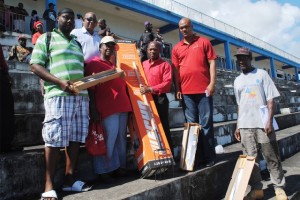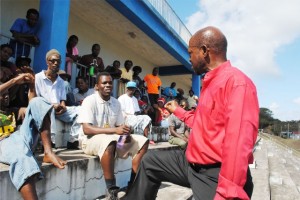Basseterre, St. Kitts (March 31, 2014) — Prime Minister, the Right Hon Dr Denzil Douglas, who also has responsibility for Human Resource, has advised persons on the People Employment Programme (PEP) to utilise skills learnt through the programme to position themselves for better paying jobs.

Addressing PEP workers attached to the Parks and Beaches Unit of the Ministry of Health on Thursday March 27 at the Saddlers Stadium, Prime Minister Douglas told them that the programme was launched in December 2012 to cushion against job losses which were a direct result of economic crisis experienced in the USA since 2008.
“The government decided that when factories in town began to close and send home people we had to find a place for them to go and have something to do, because they are people, they have families, they have children, they have to eat, and they have to pay bills,” observed the Prime Minister.
“So we decided that we would work with the Sugar Industry Diversification Foundation (SIDF) and start a programme of providing employment opportunities for people, and in particular those who were interested in learning a skill to give them the opportunity to learn a skill, and we would pay them the minimum wage.”
He thanked them for responding to the call of the government to come forward and learn a skill while receiving the minimum wage until they are able to get gainful employment elsewhere, where they would be able to get a higher wage level. He however cautioned them that they were expected to work a certain number of hours to get the minimum wage.
While these workers are being accused of just cutting grass, the Prime Minister told them that they were learning the art of landscaping, which is a lucrative career. He advised them that no matter what job they are asked to do they should do it to the best of their ability as they are acquiring a skill.
The PEP workers were however advised that they cannot to work for minimum wage for ever. “You can’t tell me that you have no pride in yourself to want to go for a higher and better wage?” posed the Prime Minister. “To be on the PEP getting minimum wage for the next two to three years, how does that help you?”
According to the Prime Minister, PEP is not designed to give more than the minimum wage and that they should therefore use the period they are on PEP to learn something that will enable their employer to take them on permanently on the job, or they set up their own businesses as the programme is a transition.

“PEP cannot sustain itself if persons who are presently on it are thinking that they will be on PEP for years to come,” said Prime Minister Douglas. “It is a programme that is engaged in training people and assisting people who would have lost jobs through a period of transition until they can find another job.
“PEP is not designed to have permanent trainees. They are trainees being assisted to acquire a particular skill and being assisted through a transitionally period after which they are expected to get into a permanent job.”
He however advised that PEP is not sending them home, but challenged them to band together and set up their own businesses, like he had seen young people in West Farm and Old Road doing, and offer landscaping services to the people of their area.
“You should be banding yourselves together forming groups, starting your own businesses,” advised the Prime Minister. “You want assistance to start off with one or two weed eaters I am willing to help you myself. Start your business, and go from place to place, you can get jobs, as people are not going to cut their lawns themselves.
“Get jobs on your own privately instead of waiting only on the PEP to advance you, because the PEP can take you that far and no further. It cannot take you where you want to be for the rest of your life; it is a beginning. We do not want you to think that you will always be on the PEP because you are not going to advance yourself if you think you are always on the PEP.”
At the meeting which was chaired by Mr Daniel Henry, Coordinator of Parks and Beaches Unit, the PEP workers were given the opportunity to engage the Prime Minister, and a very open and healthy discussion ensued. Also present was Mr Geoffrey Hanley, the PEP Project Manager, who was accompanied by Programme Officer for PEP Mrs Beverly Williams, and PEP Field Supervisor Mr Clyde Charles.
“What I want you to appreciate today is that we are not sending you home,” assured Prime Minister Douglas. “I know there are going to be challenges; there are going to be issues. I believe that you need to have a second chance, and it is being provided through the PEP.
“We are spending, every single week, over one million dollars to make sure that you have the opportunity for a second chance. Do not disappoint yourselves, do not disappoint us. I want to help you; it is my job to help you. I know I have been criticised a lot they say that I am using the SIDF money like it is my own. It is not my money, it is people’s money. It has to be spent on the people. Let us make sure that we use the opportunity that has been provided.”
